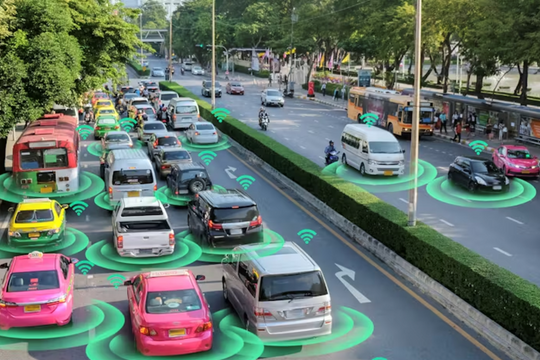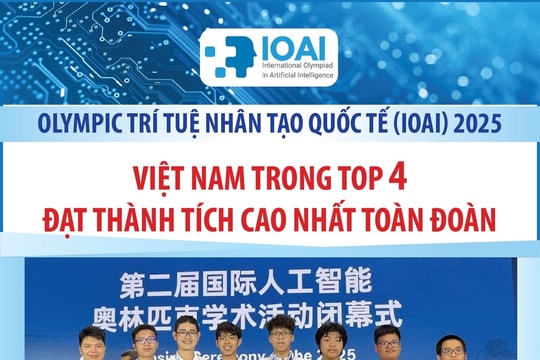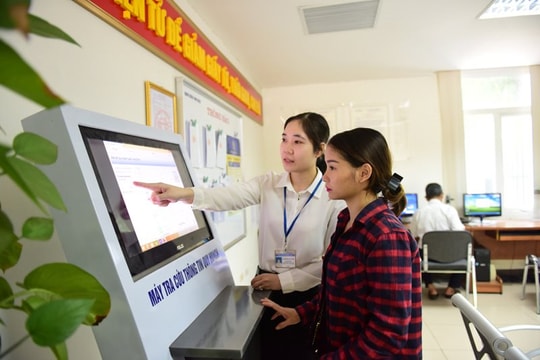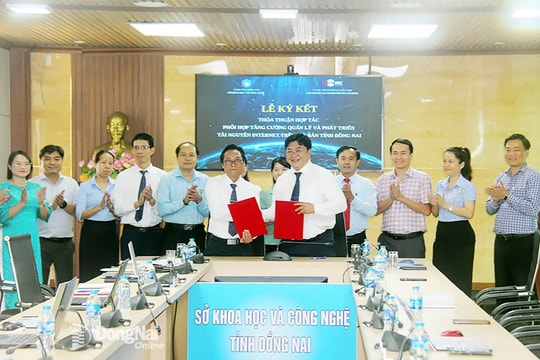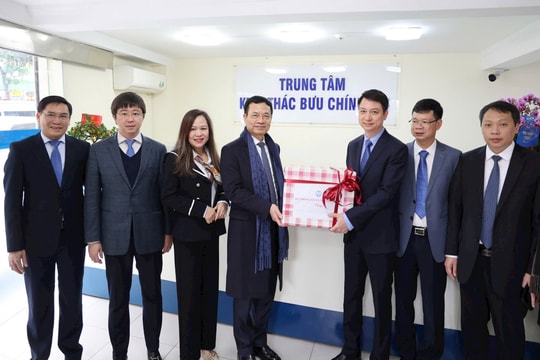
Theyear2020isapivotalyearheadingtoanewdevelopmentstageofinformationandcommunicationsectorinVietnam.Thisisaremarkableyearofthe nationaldigitaltransformationprogram,inwhichweshapeourvisionforthedevelopment oftheinformationtechnologyfieldinthenext10years.DigitaltransformationisexpectedtocreateanewdrivingforceforeconomicgrowthandsocialdevelopmentinVietnam.
Overthepast10years,informationtechnologyhasplayedaroleasaneffectivetooltosupportactivitiesofagencies,organizationsandpeople,toimprovelaborproductivityandqualityoflife.However,wetendtooverestimatethechangesinthepast10yearsbutunderestimatewhatmighthappeninthenext10years.Thisisunarguablytrueinthefieldofinformationtechnology,wherethefastpaceddevelopmentoftechnologycontinuestoremainexponentiallyinthelongrun.Theprocessingspeedofchipsdoubledevery18monthswithdecreasingsize.Thefibertransmissionratedoublesevery 9 months. Storage capacity per cm2 of hard drive doubles every 13 months. Technology's relentless breakthroughs have gradually overcome physical limitations and leading mankind into the digital age with unprecedented scenarios ever.
In the next 10 years, digital technology - the next evolution of traditional information technology is taking on a new mission: to create a driving force for digital transformation in all socio-economic fields. The convergence between digital technologies and each and every single field implies new breakthroughs that cause radical disruption to traditional values and create new ones. Traditional and sluggish businesses are vulnerable to digital challengers, and confronting risks of extinction as a revolutionary part of history. In the digital age, businesses will have less and less time to make "digital transformation or not" decision but find the own way on how to perform digital transformation instead.
Public sector is also confronting digital transformational pressures, despite not facing any digital challengers. As stated in the National digital transformation program, transforming digital government is one of the three strategic pillars. Advanced digital government shall imply holistic changes of the Government's operations towards serving citizens and businesses in a more efficient and effective manner. The proactive and pioneering government in digital transformation shall create a driving force to accelerate overall transformational process and create dynamic thrust for the digital economy and society digital transformation. Digital government has become an inevitable trend. In 2020, the United Nations named E-Government Report as "Digital Government in the Decade of Action for Sustainable Development".
The 10-year National Transformation Program with a 10-year vision shall radically transform the country. Vietnam is expected to be among the top 50 countries in e-Government, digital economy contributing 30% of GDP; annual labor productivity increases at least 8%; every citizen has the opportunity to access and experience customized essential services, and no one should be left behind. To achieve that goal, it requires strong determination and a new disruptive approach, suitable with the context and practices of Viet Nam. This point of time is a great chance to look back and evaluate key results since the approval of the national program in June 2020.
DIGITAL GOVERNMENT

The first and foremost task in digital government transformation is created an integrative online environment for ministries, sectors, and provinces to exchange documents and data to enhance intra-government communication. For that purpose, the National Government Service Platform (NGSP) was established to facilitate information sharing between ministries, sectors and provinces. Each ministry, sector and province are expected to follow the guideline and architectural model to establish its own Local Government Service Platform (LGSP) and plug into NGSP for inter-communication. By 25th November 2020, there are 21/22 ministries, ministerial-level organizations; 62/63 local provinces/central provinces have deployed LGSP that is accountable for 97.6% in total.
Another important pillar of digital government is transforming citizen's experience in provisioning public services through online environment. According to Circular 26/2009/TT-BTTTT dated on 31/7/2009, online public services are classified into four levels:
The first level is providing full information about procedure steps, processing time frame, and relevant fees. The second level includes requirements of the first level and downloadable forms published on websites. Once filled, forms could be submitted in person or through postal service. The third level includes requirements of level 2 and facilitate citizens to fill up and submit direct online forms to public service providers. Processing steps are conducted through online environment. Relevant fee payment and document reception are conducted at public service provider's side. The fourth level includes requirements of level 3 and facilitate service' consumers to make online payment. Output documents are opted to be delivered online, through postal service or in contact at service provider's side.
In 2020, online public service provisioning has been enhanced to the next level. As of October 2020, the ratio of online public services level 3 and 4 are accountable for the
majority with 53,37% of total online public services, roughly 4% higher than in September (49,61%). In the same period, it's remarkable that the ratio of online service level 4 itself increased by 5% (from 19% - 24%) that accounts for 2% reduction of online service level 3 (from 30,51% - 28,66%) (converted to level 4). Fee payment for online public services could be done through PayConnect platform which connects existing intermediate payment agencies that reduces the complicated for online service providers. This positive result originates from a new approach which utilizes the concept of digital platforms. All services are transformed using a shared and reusable component to reduce design and development time and effort.
Ministry of Information and Communications is drafting National strategy on e-Government towards digital government development. The key idea of this 5-year strategy is to holistically transform government services using digital platforms, government data, providing fast, efficient and secure online public services for all. At this stage, Ministry of Information and Communications has established a national data repository (data.gov.vn) which is free and open for public use.
During COVID-19 pandemic, Ministry of Information and Communications has promoted the concept of digital government with 4 "No": No paper document required, no physical meeting required, public service provisioning with no physical contact required and payment with no cash required.
DIGITAL ECONOMY
Digital economy opens opportunities for citizens and businesses to engage in economic activities through digital platforms, regardless their physical location. Through e-commerce digital platforms, citizens from rural and mountainous areas are empowered to sell their farm products nationwide or even go global, turning any of them to become a "micro business" on cyberspace.
The fastest way to perform digital transformation is through digital platforms. Digital platforms enable businesses and citizens to participate in digital economic and e-commerce without advanced digital skills and upfront huge financial investment required. Being aware of that importance, to accelerate the digital transformation process, the Ministry of Information and Communications sets the target to develop a robust local digital platform ecosystem for each sector and implements an initiative to organize inauguration ceremony to launch one digital platform per week as part of "Make in Viet Nam" initiative. The Ministry also emphasizes the importance of using open technologies to develop local solutions to solve local problems. Full control of technologies is critical to protect national sovereignty and transform the country to an advanced country.
Todate,thereareapproximately35digitalplatformshaveofficiallyjoinedtheprogramandgetreadytoboostthenationaldigitaltransformation.Tonameafew:postaladdresscodeplatformsVpostcode,onlineconferenceZavi,Comeet;generalenterprisemanagementplatform1Office; technology platform for Vietnamese speech processing VAIS and Vbee; platform for cybersecurity monitoring SOC; platform for communication and video streaming Stringee; blockchain technology platform akaChain…
DIGITALSOCIETY
Oneofkeysuccessfactorsofdigitaltransformation isturningsmartphones into commodity goodswhichare affordabletocitizens,includingthoselivinginremoteandmountainousareas.Withoutsmartphone,onemighthavelimitationinaccesstoonlineservicesandparticipatinginotheractivitiesinonlineenvironment.Therefore,theNationaldigitaltransformationprogramsetacrystal-clearpurpose:each citizen owns at least one smartphone and each household owns at least one fiber optic cable. Once the ubiquity of Internet and smartphone is obtained, businesses and citizens have immense of opportunities to access and consume digital government services.
Through smartphones and digital platforms, citizens from any part of the country may have equal rights in access to high quality services in different sectors. For example, in the health sector, telehealth platforms empower citizens to use remote medical services from the best doctors. In the educational sector, students have options to choose the most suitable online courses delivered by most excellent teachers nationwide or even worldwide without any physical limitations. Thanks to those platforms, during COVID-19 situation, contactless activities are promoted and bring our lives to the new normal.
CYBERSECURITY
In National digital transformation program, cybersecurity is identified as an integrative component of digital transformation. In order to enhance cyber capability nationwide, the Ministry of Information and Communications (Authority of Information Security) builds up a reference model that includes 4 layers of protection and facilitates ministries and local provinces to deploy:
- The first layer involves in-house cybersecurity team who may handle basic cyber incidents.
- The second layer involves monitoring services provided by managed service providers. This layer often requires a security operation center (SOC).
- The third layer involves audit services performed by another managed service provider which is different from provider in the second layer.
- The fourth layer requires sharing cyber threat information to the National Cybersecurity Center (NCSC) - Authority of Information Security.
As of 25th, November 2020, there are about 95,1% of ministries, sectors and provinces which have completed 4-layer protection deployment. The 4-layer protection model sets a dual-target: to overcome the shortage of high-quality cybersecurity human resources in local provinces and to expand domestic markets for local managed service providers, while still enhance cybersecurity level.


